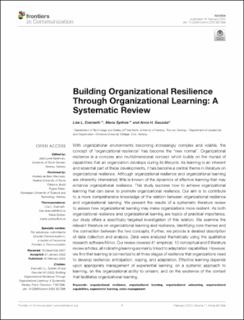| dc.contributor.author | Evenseth, Lise Lotte | |
| dc.contributor.author | Sydnes, Maria | |
| dc.contributor.author | Gausdal, Anne Haugen | |
| dc.date.accessioned | 2023-02-22T12:59:48Z | |
| dc.date.available | 2023-02-22T12:59:48Z | |
| dc.date.created | 2022-02-25T12:37:52Z | |
| dc.date.issued | 2022 | |
| dc.identifier.citation | Front. Commun. 2022, 7:837386. | en_US |
| dc.identifier.issn | 2297-900X | |
| dc.identifier.uri | https://hdl.handle.net/11250/3053307 | |
| dc.description.abstract | With organizational environments becoming increasingly complex and volatile, the concept of “organizational resilience” has become the “new normal”. Organizational resilience is a complex and multidimensional concept which builds on the myriad of capabilities that an organization develops during its lifecycle. As learning is an inherent and essential part of these developments, it has become a central theme in literature on organizational resilience. Although organizational resilience and organizational learning are inherently interrelated, little is known of the dynamics of effective learning that may enhance organizational resilience. This study explores how to achieve organizational learning that can serve to promote organizational resilience. Our aim is to contribute to a more comprehensive knowledge of the relation between organizational resilience and organizational learning. We present the results of a systematic literature review to assess how organizational learning may make organizations more resilient. As both organizational resilience and organizational learning are topics of practical importance, our study offers a specifically targeted investigation of this relation. We examine the relevant literature on organizational learning and resilience, identifying core themes and the connection between the two concepts. Further, we provide a detailed description of data collection and analysis. Data were analyzed thematically using the qualitative research software NVivo. Our review covered 41 empirical, 12 conceptual and 6 literature review articles, all indicating learning as mainly linked to adaptation capabilities. However, we find that learning is connected to all three stages of resilience that organizations need to develop resilience: anticipation, coping, and adaptation. Effective learning depends upon appropriate management of experiential learning, on a systemic approach to learning, on the organizational ability to unlearn, and on the existence of the context that facilitates organizational learning. | en_US |
| dc.language.iso | eng | en_US |
| dc.rights | Navngivelse 4.0 Internasjonal | * |
| dc.rights.uri | http://creativecommons.org/licenses/by/4.0/deed.no | * |
| dc.subject | organizational resilience | en_US |
| dc.subject | organizational learning | en_US |
| dc.subject | crisis management | en_US |
| dc.subject | organisatorisk resiliens | en_US |
| dc.subject | organisatorisk læring | en_US |
| dc.subject | krisehåndtering | en_US |
| dc.title | Building Organizational Resilience Through Organizational Learning: A Systematic Review | en_US |
| dc.title.alternative | Building Organizational Resilience Through Organizational Learning: A Systematic Review | en_US |
| dc.type | Peer reviewed | en_US |
| dc.type | Journal article | en_US |
| dc.description.version | publishedVersion | en_US |
| dc.source.journal | Frontiers in Communication | en_US |
| dc.identifier.doi | 10.3389/fcomm.2022.837386 | |
| dc.identifier.cristin | 2005472 | |
| dc.source.articlenumber | 837386 | en_US |
| cristin.ispublished | true | |
| cristin.fulltext | original | |
| cristin.qualitycode | 1 | |

